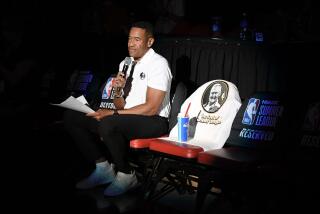- Share via
Before Pat Riley led the Showtime Lakers to four NBA championships — and became a celebrity in his own right — the team went through enough coaching drama to fuel a soap opera.
In Episode 3 of “Binge Sesh,” hosts Matt Brennan and Kareem Maddox bring you the backstories of four key players in HBO’s “Winning Time,” each of whom served as head coach of the Lakers in the four years at the start of the Showtime era: Jerry West, Jack McKinney, Paul Westhead and Riley. From sudden departures and unfortunate accidents to Shakespearean betrayals and tabloid stardom, strap in for the series of unfortunate events that helped form the Showtime we know and love.
Listen now
Matt Brennan: One coach that I know from basketball history, on sight, is Pat Riley. “Winning Time” co-creator Jim Hecht remembers listening to Riley on the radio in the 1970s in L.A.
Jim Hecht: And I always thought that was weird. Oh, my God, the announcer became a coach and stuff like that. It just sounded silly that he was going to be the head coach. He didn’t see himself as a coach, because to him, his dad was a coach. Adolph Rupp was a coach. You know, really hard-ass, unlikeable characters. And so he ran from that a lot.
Brennan: Riley eventually became a Hall of Fame NBA coach, not just with the Lakers, but with the New York Knicks and the Miami Heat. And with his career change, he underwent a bit of a transformation as well.
Hecht: He’s this guy who came from the ’60s and was a hippie and then transforms into the guy who is literally the inspiration for Gordon Gekko in “Wall Street.”
Brennan: That’s one of the most iconic movie characters of the ’80s — the guy who told us greed is good.
Hecht: Michael Douglas based that character, the hairstyle on all that; he becomes, like, he is the figure of the ’80s. So from that Sonny Bono beach bum guy, he becomes the icon for being a yuppie. And it took him a lot to be able to accept all that and the mustache and the suit and the hair back is all him begrudgingly coming into that person that he was supposed to be and resisted his entire life.
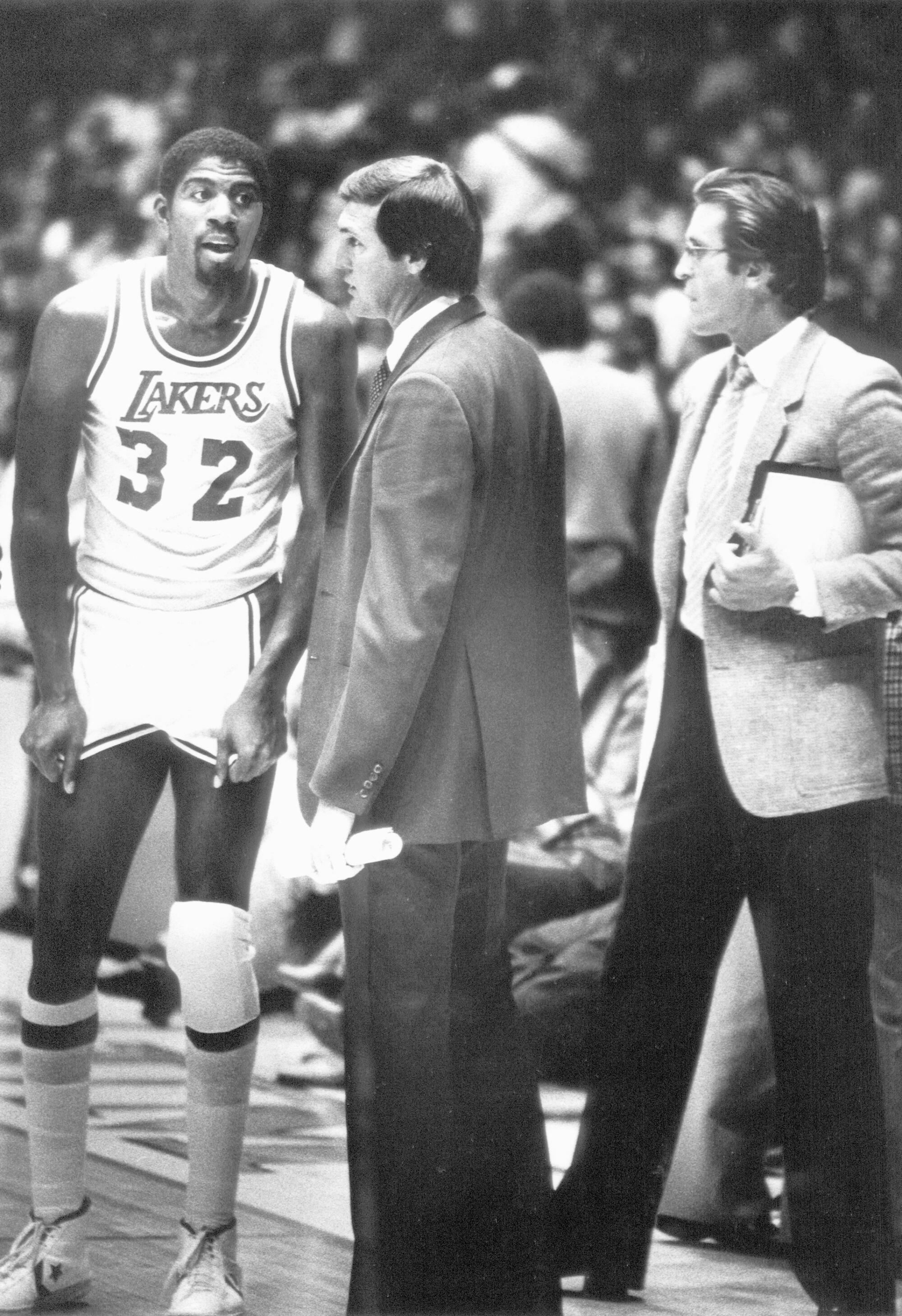
Brennan: But him becoming the head coach was not preordained. It was actually like a series of unfortunate events.
Welcome to “Binge Sesh,” where this season we’re diving into the stories behind HBO’s “Winning Time,” the saga of the Showtime-era L.A. Lakers. I’m Matt Brennan, TV editor of the Los Angeles Times.
Kareem Maddox: And I’m Kareem Maddox, future TV editor of the L.A. Times and basketball guy.
Brennan: Please take my job. It’s exhausting. There’s so much TV.
Maddox: This week we’re going to look at coaches. Laker coaches, to be specific.
Brennan: I think because I’m a TV guy, I love titles. So I’ve been thinking a lot about the titles of our podcast episodes because it’s fun for me. And I think I’ve landed on the title for this one.
Maddox: All right, let’s hear it.
Brennan: “All My Coaches.”
Maddox: OK. It’s a play on “All My Children”?
Brennan: Right, exactly. Because the Lakers went through four coaches in a span of less than four years at the start of the Showtime era, starting with Jerry West, then Jack McKinney, then Paul Westhead and finally Pat Riley. And though we think of Pat Riley as the coach of the Showtime Lakers, how he got to that place is actually incredibly dramatic — “All My Children”-level dramatic.
Maddox: It was, and “Winning Time” drops us in the middle of the drama in Episode 3, when the character Jerry West quits as head coach at the start of the 1979 season and then gets cursed out by the Jerry Buss character.
[Clip from “Winning Time”: Jerry Buss character: Know what I think? I think you’re chickens—. That’s what it is. You’re afraid I’m going to get you all the tools you need and you’ll still f—ing lose.
Jerry West character: I’m not afraid of that.
Buss character: Bulls—.
West character: I know it. I know it for a goddamn fact, because I’m lousy at it.]
Brennan: I think I’ve fallen in love with Jerry West.
Maddox: Oh yeah?
Brennan: He is someone who, the more I read about him, the more fascinated and sympathetic to him I become. And the scene in “Winning Time” that you mentioned, Kareem, captures so acutely the stomach-churning feeling of caring too much about your job, which I know very well.
[Clip from “Winning Time”: West character: I’m a, I’m a, I’m a, I’m a s— coach. I am, I sit there helpless watching these guys pissed to hell that they ain’t me. And, even worse, that I can’t be them.]
Brennan: He played in the NBA for 14 seasons. He was a 14-time All Star. He won just one championship, with the Lakers.
Maddox: And he lost a bunch more.
Brennan: He lost many, many, many of them, to his great frustration.
[Clip from “Winning Time”: West character: I mean, f— it. I swear to God, if I could suit back up now, I’d play for you right now in a heartbeat.]
Brennan: Do you want to know what the subtitle of his autobiography is? “My Charmed, Tormented Life.”
[Clip from “Winning Time”: West character: I mean, s—, I’d die for you right now, but I can’t get you to where you want to go screaming from the f—ing sidelines.]
Brennan: And so he is actually this incredibly rich and complicated and human figure. He grew up in West Virginia. His father was abusive. His brother died in the Korean War. But I totally have come to identify with his feeling of having such an intense amount of passion for a thing that it actually causes him harm. And I find that kind of almost sweet. If there is one person on Earth whose blood actually runs purple and gold, I bet it’s Jerry West.
Hecht: I don’t try to play favorites with our characters, but Jerry West is definitely up there.
Maddox: That’s Jim Hecht again, co-creator of “Winning Time.” And according to him, the reason why you love Jerry West so much is because the writers in the room wanted you to.
Hecht: I think the reason why I gravitate towards him is because there is that element of, he writes about his depression, describes basketball as a compulsion and an addiction, and the cycle of it that he paints about getting out of basketball, going through withdrawal, getting a little taste of it, having to get back in all the way, needing full control and so on and so on and so on. It speaks to me. So to hear Jerry West describe how he feels, for all he’s accomplished and all that he has done — his head sounds like mine. It’s a level of humanity that I couldn’t help relating to and being drawn to and feeling a lot of compassion for.
Maddox: But I have to say when I talk to other people about “Winning Time,” the resounding question is: Was Jerry West really like that? So we asked Jason Clarke, the actor who plays him: Was West really that intense?
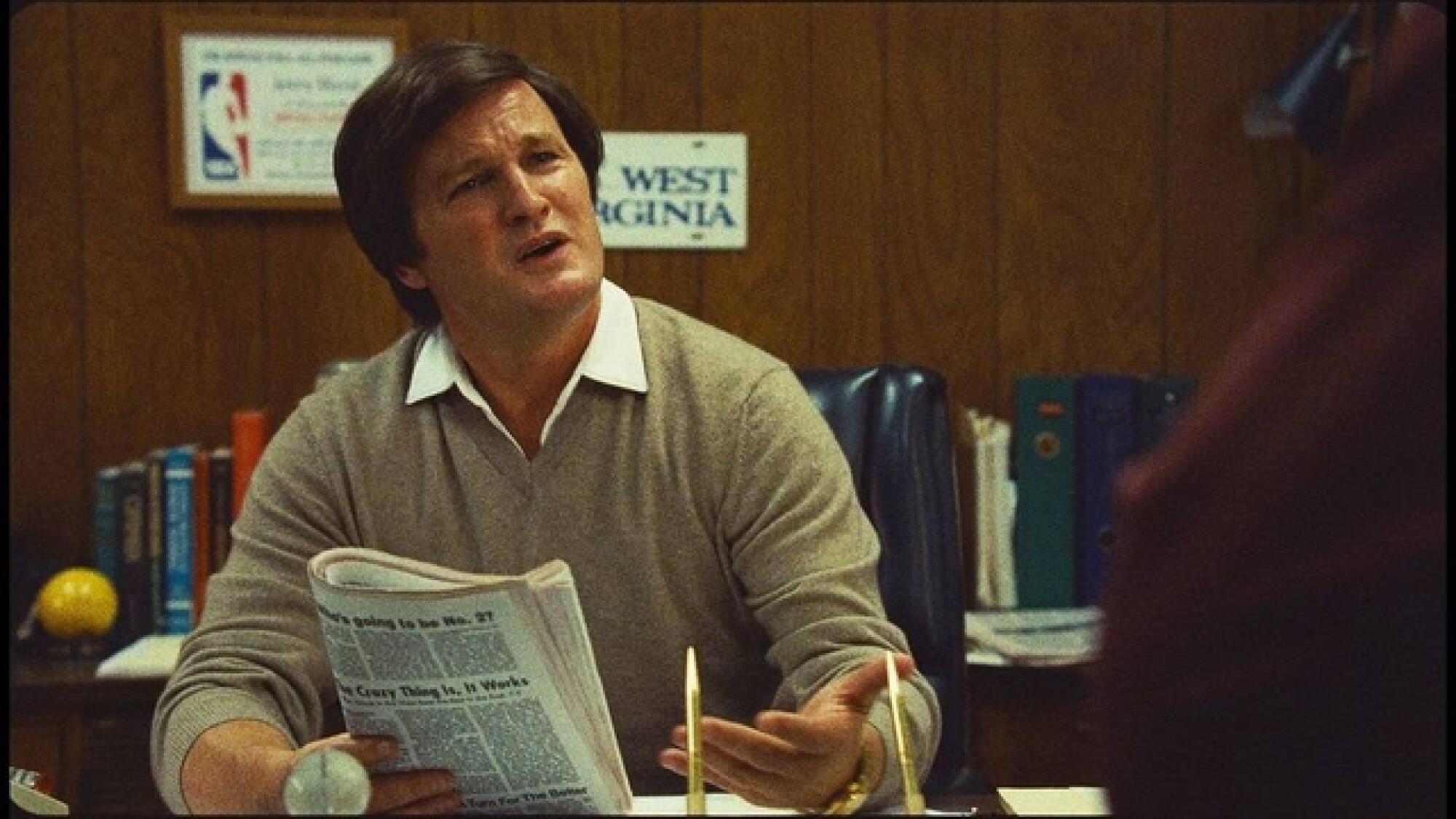
Jason Clarke: My first scene in the part of the whole thing was the golf course scene, you know?
Maddox: Yeah.
[Clip from “Winning Time”: West character: F—ing have them coach, OK? I f—ing quit. I’m done. I’m f—ing done. I can’t even play a game of f—ing golf without you bringing up —]
Jason Clarke: And I really thought, I’m just going to put this way out there and go for it and see what happens. I mean, I took off half the f—ing green with my foot. I just went big. And so that was one way of just testing the waters of how big do these guys want me to go.
He’s just always got an inner monologue going. So I would talk myself into a f—ing frenzy. I’d start just working it up and having this dialogue with myself ... ’cause at this point, Jerry is like, he’s a ship that just can’t unmoor himself.
There’s some other guys that I never really paid attention to in the makeup trailer that day, and then one of them comes up while we’re shooting and said, “Dude, I worked with Jerry West for 30 years, man. F—ing great job. He, we used to call him Jerry F—ing West.”
[Clip from “Winning Time”: West character: Your c—sucking, motherf—ing, buttf—ing billboards don’t play the game of basketball!… I f—ing busted my shaft.]
Brennan: Let’s do a quick review. It’s 1979. Magic Johnson has been drafted to the Lakers. Jerry Buss is coming in as the new owner, and Jerry West, the passionate coach, is seeing how things are going to change and he nopes right on out of there.
Why would someone do that when things are actually starting to get good or at least seem like they might? We asked Jeff Pearlman, author of the book “Winning Time” is based on, this very question.
Jeff Pearlman: That guy was a walking heart attack at 30. So it’s amazing he’s still alive. And he’s so hard on himself, but when it’s not just about yourself and you’re sending out these players to do what you tell them to do, but they don’t do it, the pain is so intense.
Brennan: So West can’t stand coaching, but he also can’t stay away from basketball. So he eventually becomes the Lakers’ general manager. And he couldn’t bear to watch the team play. We talked to L.A. Times sports columnist Bill Plaschke about what West used to do during some of the biggest games of the Showtime era.
Bill Plaschke: He couldn’t stand watching the games. The pressure got to him. Some of the greatest Laker games ever, he’s out — he tells stories that he’s driving up and down the 101 [Freeway] going to Santa Barbara and back, going to see a movie, during the game. The pressure got to him when he couldn’t control it. When he couldn’t be on the court and control it, it drove him crazy. He’d build a team and then he’d run away from it and cover his ears and hope, hope he did great.
Brennan: What I think is funny is despite him putting so much pressure on himself and despite feeling almost physical distress during games, he was the Lakers’ general manager for 23 years. The guy could not get enough of basketball even though it sort of drove him nuts. And I, like I said, I think I am falling in love with Jerry West because how can you not appreciate someone who lives like that?
Jason Clarke again:
Clarke: I was at the game the other night. You know what I see? I see the players hugging each other on the opposite teams before the game, and I’m saying, f—, Jerry hates that, man. Dude, you’re at war, what the f—?
My mind-set, it had really gone there, I think because he was so much fun to play, you know, and I love hearing that people relate to him because it means that’s come across. I didn’t want to be angry. I just wanted to care.
Maddox: I can imagine that Jerry West would have been a tough boss, especially if you’re a player that he’s coaching and he’s asking you to do things that he can do, but he’s the literal logo of the league. Like, he’s that good. So I bet there’s a lot of old players that have issues with Jerry West, but here’s the thing: Everyone respected him. Here’s Jeff Pearlman again:
Pearlman: You won’t find anyone in the NBA who doesn’t respect Jerry West, even if they don’t like him, and I haven’t met anyone who doesn’t really like him. Because he has so much integrity and he just lives this stuff.
Brennan: In short, Jerry West was maybe not the most legendary Lakers player, but he might be the most legendary Laker ever.
READ MORE >>> After 40 Years, Lakers’ Jerry West Benches Himself
Maddox: And he’s just the beginning of our story. His departure from the coaching job sets in motion a cascade of events that produces two more Laker head coaches before Pat Riley takes over.
Brennan: And we’re going to tell you all about it after this break.
::
Maddox: Welcome back to “Binge Sesh.” So we’ve just finished swooning about Jerry West, the first Lakers coach in this era, but once Jerry West quits, the next guy to take over is Jack McKinney. He’s the bespectacled character in “Winning Time” who walks into Jerry West’s office just as West is packing up his bags.
[Clip from “Winning Time”: West character: Who the f— are you?
Jack McKinney character: We met a few times. Jack McKinney. I’m the assistant coach in Portland.
West character: Hey, thanks for the conversation.
McKinney character: I hope we can finish it sometime.
West character: Yeah, absolutely. You know Chick.
Chick Hearn character: Hey, Jack, how are you? Good to see you, pal.
West character: Uh, no, no, no, no, Bill. I mean, what the f—ing f— of a f—, dude. I mean, that guy’s a f—ing nobody.]
Brennan: I agree with Jerry West. Who the f— is Jack McKinney?
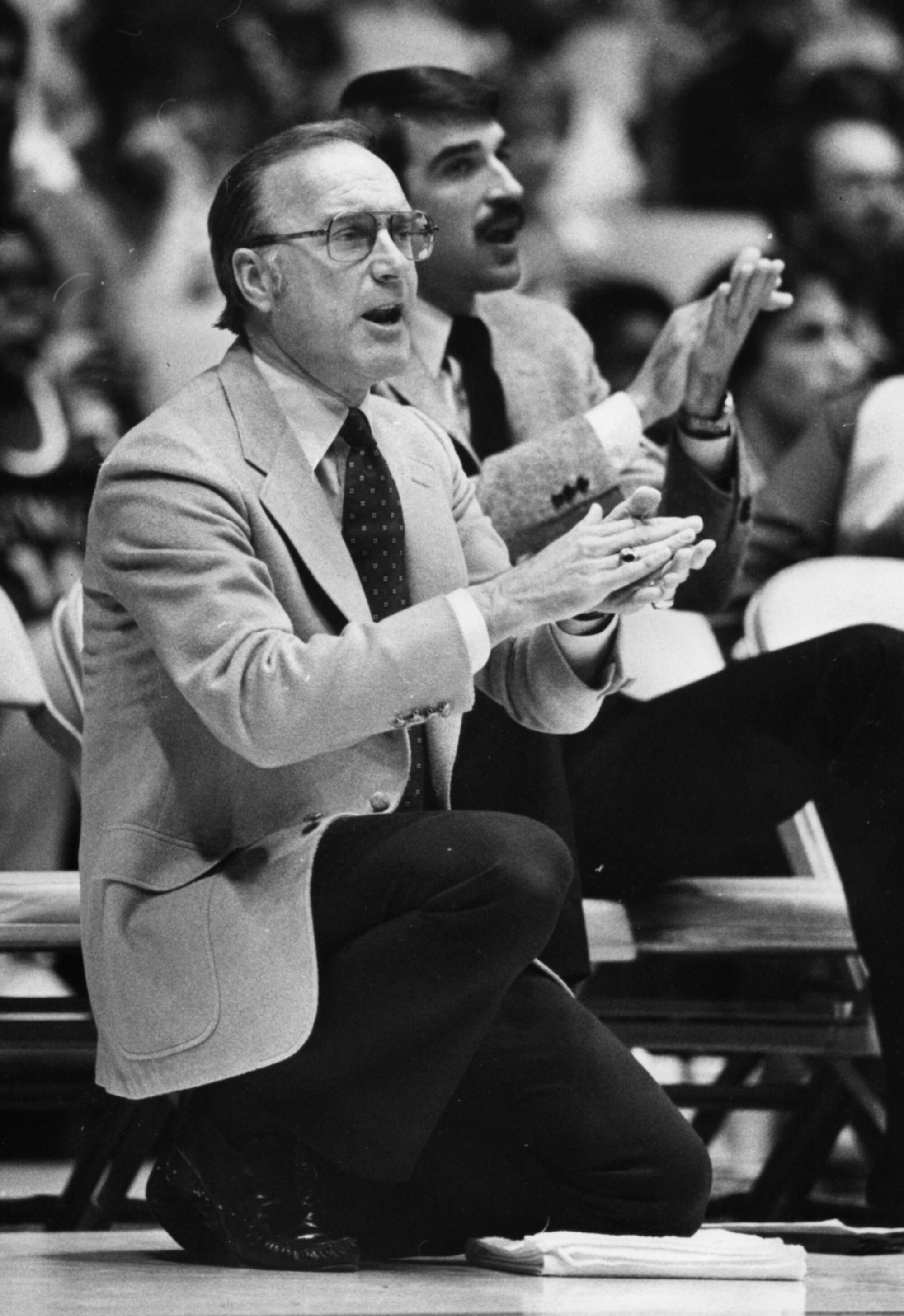
Maddox: Well, he kind of was nobody. So he rose through the coaching ranks. He had been assistant in other places, you know, Portland. And then the show shows us Jerry West, starting to watch the reels of these old McKinney teams, and what he starts to see is that McKinney’s style of basketball that his previous teams have played was actually really interesting, and I think the show is teeing us up to learn that Jack McKinney is kind of the architect of the Showtime offense.
[Clip from “Winning Time”: West character: I saw the progression, Bill. This guy McKinney is a f—ing idiot savant. I mean, first year he came in, he turned the team in Portland right around — as an assistant. I did, I spoke to [Portland head coach Jack] Ramsay. . It was his Xes and Os. I mean, he took a squad of spare parts and turned it into a f—ing Rolex, made them tick right to the title.
Bill Sharman character: They call it “retired” for a reason, Jerry.
West character: Dr. Buss! This coaching thing —]
Brennan: Workaholic icon Jerry West trying to find the next head coach, even after he just quit being the head coach because it drove him crazy. What did the McKinney system consist of, and how do you get from the McKinney system, quote unquote, to Showtime basketball? How are those things related?
Maddox: So before Jack McKinney takes over in 1979, the Lakers have the best big man in the league, Kareem Abdul-Jabbar. And like most other NBA teams at the time, the offense revolved around Kareem or whoever the biggest guy on the floor was. So the Lakers would slowly bring the ball up, find a way to dump it to Kareem. And then everyone would watch Kareem, you know, probably shoot a sky hook.
Maddox: That’s what the Jack McKinney character was talking about here.
[Clip from “Winning Time”: McKinney character: You know, dump the ball and post, watch the big man go to work. Dependable. Conventional. I’d want to try something, I don’t know, a lot more, more, uh, I don’t know, a lot more unique.
West character: Unique, yeah.]
Maddox: Unique meant changing the pace and picking up the tempo. So when your whole offense centers around throwing the ball to Kareem and then having nine guys watch him work, other teams can just kind of plan around that and strategize to stop the big fella. Jeff Pearlman explained how McKinney started to solve for that.
Pearlman: He was involved in implementing a system. He thought the Lakers walked the ball up too much under Jerry West. He thought they were too slow. They were Kareem-anchored.
And he looked at this roster. He’s like, “We have this new kid, Magic Johnson. We have this really fast point guard named Norm Nixon. I love this kid, Michael Cooper; he’s a slasher. Um, Jamaal Wilkes can still get up and down the court.” So he just looked at the personnel they had and thought that we could be doing this much differently. And when you see what became Showtime — first under Paul Westhead, then under Pat Riley — that’s all Jack McKinney.
Maddox: So the McKinney system is predicated on moving the ball around the court as quickly as possible. First, Magic Johnson runs the ball up the court as fast as he can. Then he passes it to Michael Cooper and cuts to the basket. Then Cooper passes it to Kareem and he runs somewhere else. And what this does is create a lot of action that the other team then has to guard.
Brennan: My head is spinning and I’m just listening to you describe it.
Maddox: What that does is makes Kareem Abdul-Jabbar actually more effective. Instead of catching the ball and having the other team’s full attention, they’re concerned with guarding Jamaal Wilkes cutting to the basket for an open layup. And while the other team is worried about that, Abdul-Jabbar gets to shoot some of the most uncontested shots that he’s probably seen in a decade by that point. This style of basketball eventually evolves into what’s known as run-and-gun, where it’s about running the other team into the ground. And right when Jack McKinney can’t coach anymore, only 14 games into that 1979 season, the next coach, Paul Westhead, adopts this same system.
We should talk about Westhead now, because we don’t want to spoil how McKinney became unable to coach, but Paul Westhead is a fun character.
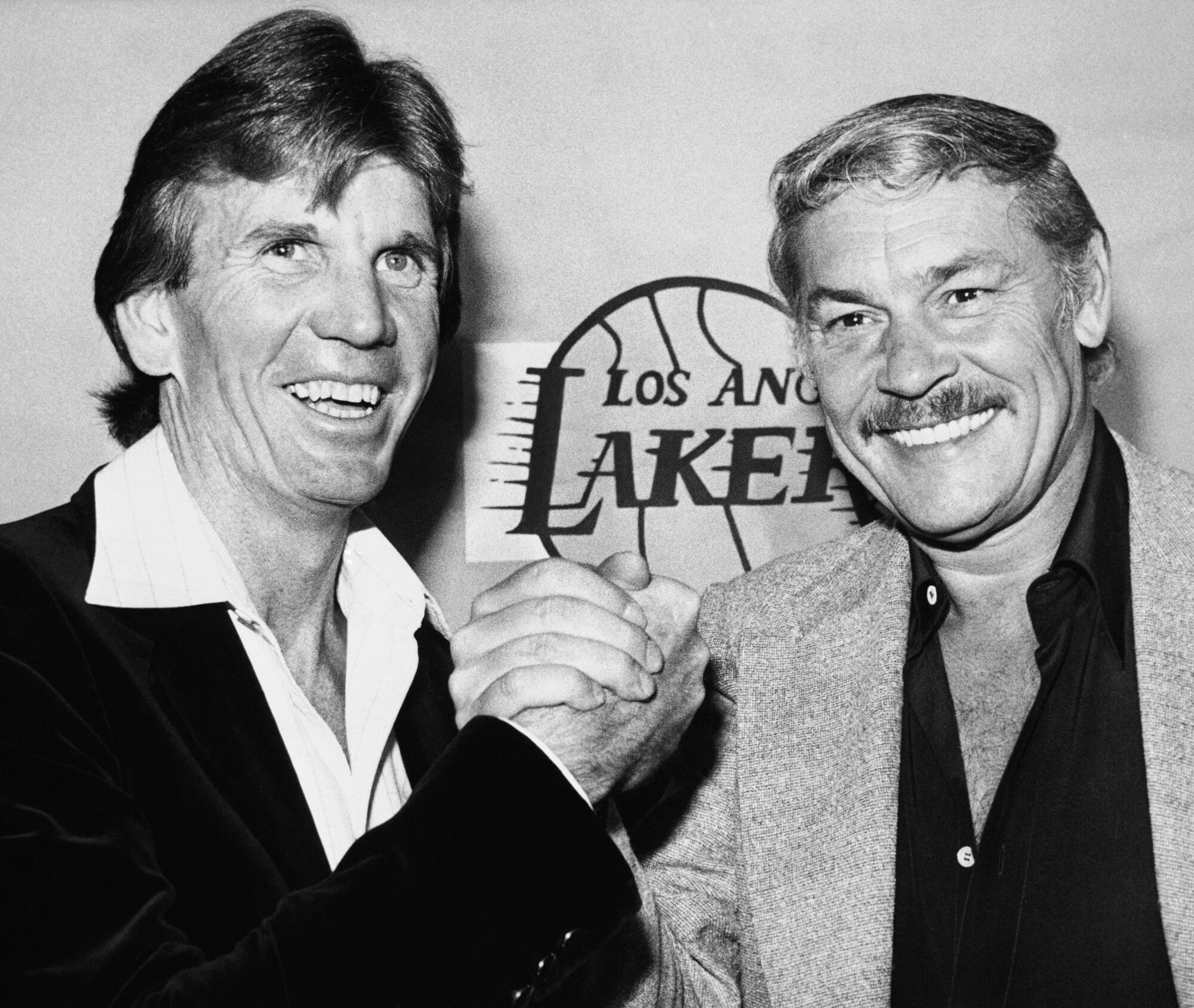
Maddox: He was McKinney’s assistant coach before being promoted. And he actually knew McKinney from way back. Paul Westhead played for McKinney at St. Joseph’s College, which might have something to do with how he got the assistant coaching job.
Brennan: We won’t meet Westhead in “Winning Time” until next week — he’s played by Jason Segel — but Westhead is an important transitional figure in the Showtime era.
One, he has a really deep relationship with McKinney dating back to when Westhead played for McKinney. Two, because of that loyalty to McKinney, he holds on to and adopts the McKinney system when he himself becomes head coach. And three, he picks Pat Riley as his assistant, which makes Riley the heir to this “Game of Thrones” coaching situation when Westhead will eventually get pushed out, which we’ll get to.
The thing that I think is the most entertaining about Westhead and what makes him a great character in the show is that Westhead was also an English professor. He wrote his master’s thesis on “Titus Andronicus.”
You studied English. Have you ever come across this play?
Maddox: I have but never read it.
Brennan: It’s Shakespeare’s first tragedy, and it’s also probably his most highly criticized play. It’s been called a “heap of rubbish”; “scarcely tolerable to any audience”; and T.S. Eliot described it as “one of the stupidest and most uninspired plays ever written.”
Maddox: Are these all reviews hundreds of years after he wrote the thing?
Brennan: Yes.
Maddox: So it was so bad that people still felt the need to trash it in reviews centuries after.
Brennan: The reason I bring this all up other than the fact that I think it’s funny is Paul Westhead charmed the press in a lot of ways because he had this kind of idiosyncratic approach. You know, he adopts this run-and-gun system, but he’s quoting Shakespeare at press conferences.
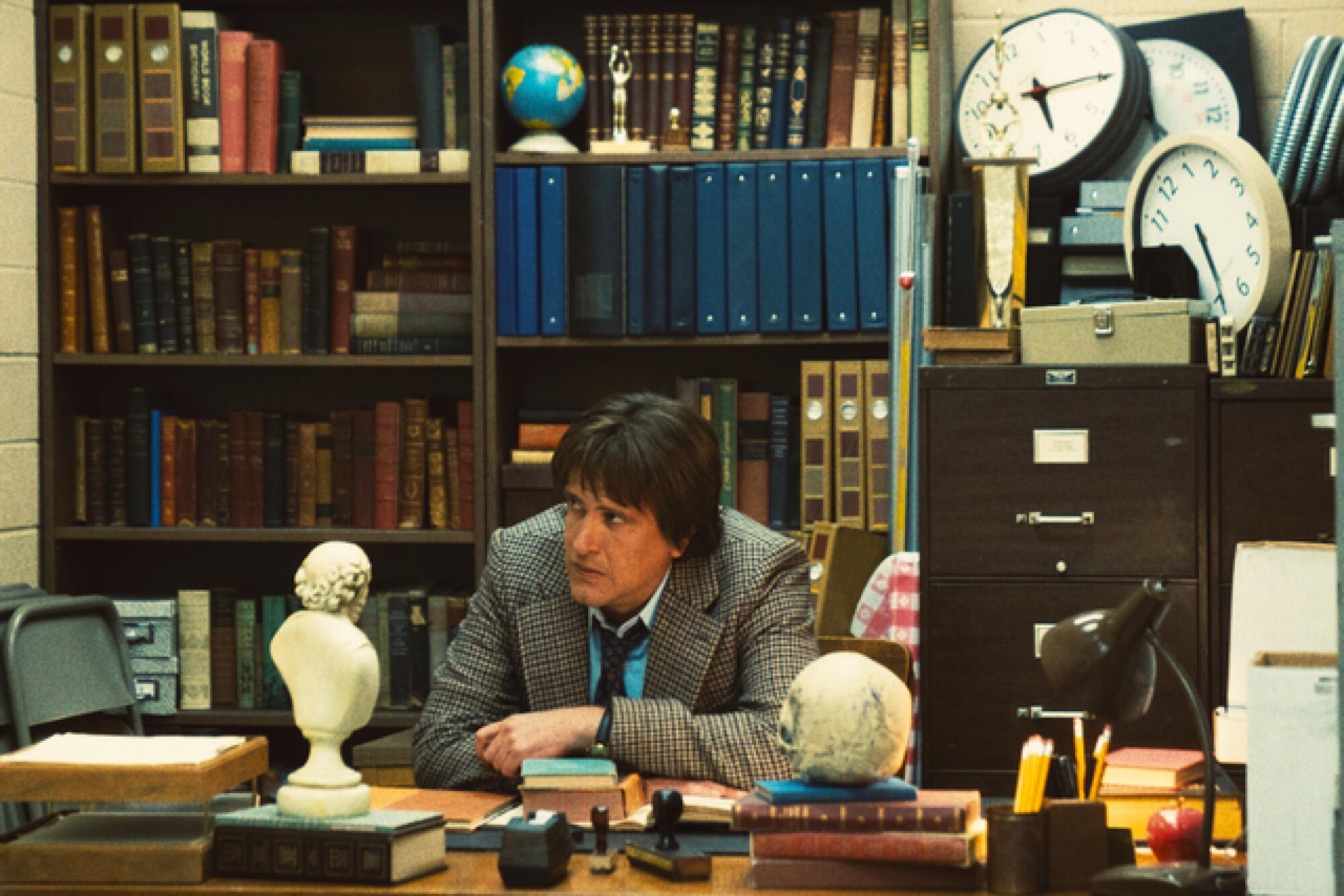
Maddox: Right.
Brennan: But it ended up becoming — well, Jeff Perlman described it.
Pearlman: Like it was a gimmick. He didn’t mean it to be a gimmick, but it became a gimmick and people would write about the Lakers and they’d include some Shakespeare quote. It just started feeling insincere and sort of corny and cornball. And the idea of this bookish former literature professor offering up Shakespearean quotes, it’s just preposterous. It’s actually preposterous.
To his credit, first of all, Westhead did guide them to a championship. And I still think Paul Westhead’s a really good coach and innovator of up-tempo basketball. I think what really happened is they win this ’79-80 NBA Championship running mainly Jack McKinney’s system, he [Westhead] sort of starts implementing his own ideas more — and we could do this, and we should mess with this. He kind of started slowing things down.
The Lakers had this system that was really good and was working. And I think his ego got a little in the way where he thought, “Well, now I’m going to do it my way and I’m going to instill my thing. We’re going to slow it down more.” And they just got tired of it and the following season was not as successful.
Brennan: He started to mess with the McKinney system and add “Titus Andronicus” levels of confusion, which was a real — I mean, as you described it, the McKinney system is meant to be simple, fluid, fast, easy. Westhead, the guy who wrote his master’s thesis about Shakespeare’s worst and most convoluted play — I couldn’t even describe to you what the plot of this is; I looked it up and it made no sense to me — he starts messing with that clean, simple, fast system.
Westhead’s system, maybe unsurprisingly, is very academic in a way. And it creates this kind of stilted play that frustrates the players. One, they find it confusing. Two, it takes away a little bit of their agency in the process — like run-and-gun relies on player instincts, it sounds like, quite a lot.
Maddox: Yes, completely.
Brennan: The other major theme of “Titus Andronicus,” ironically enough, is betrayal.
Maddox: Ah, that’s very fitting, given what happens at the start of the 1981 season.
Pearlman: Basically Magic was like, “To hell with this.” And then early in the next year, he’s like, “I’ll go talk to Jerry Buss.” And he went and talked to him and said, “This isn’t working.” And Magic got him fired. There’s no doubt about it. I don’t think he did anything wrong. I actually think he was right. That team was not working out. And if you look at the results under Pat Riley, it’s hard to argue that they should have kept Paul Westhead.
READ MORE >>> Paul Westhead’s life after the Lakers
Brennan: This brings us back to Pat Riley. To this point, Riley has been an announcer, the assistant coach under Westhead, and — when Westhead gets the boot — the head coach. But what I’m struggling to understand is how the Riley that we meet in Season 1 of “Winning Time,” this wandering guy played by Adrien Brody with a questionable mustache, ultimately becomes this sleek, cover-of-GQ businessman type who comes to represent the yuppie figure of the ’80s.
Maddox: I’m glad you asked, because we’re going on the journey of the Pat Riley glow-up after the break.
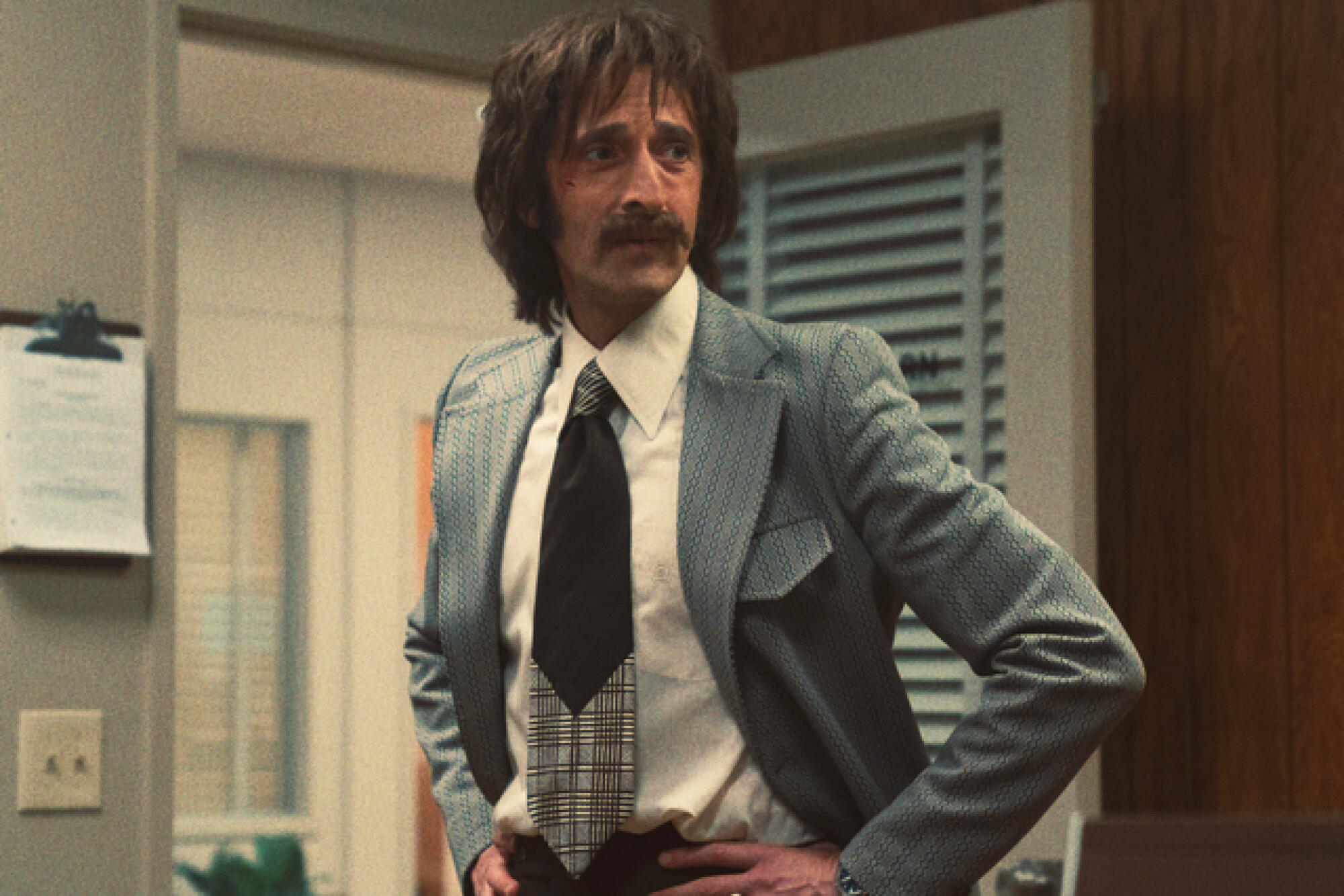
::
Maddox: I actually kind of want to go back even a little bit further. So let’s rewind the clock.
Brennan: I’m getting in my time machine. Where are we going, Kareem?
Maddox: We’re going to 1961. So we’re in the final of a Christmas tournament at Linton High School in Schenectady, New York. So pretty far upstate, like past Albany, and it’s just after Christmas. You’re from the Northeast. What am I imagining?
Brennan: You’re probably wearing a hat —
Maddox: Flannel.
Brennan: — gloves, a heavy coat, winter boots. There’s probably snow on the ground. Um, it’s bitterly cold.
Maddox: OK, so we’re walking into Schenectady bundled up and we are watching Linton High School’s star senior. His name is Pat Riley and he’s playing in a championship game against New York City’s Power Memorial. Any guesses as to who Pat Riley is playing in the championship of this Christmas tournament in Schenectady?
Brennan: Oh, my God. Wait, Pat Riley played Kareem Abdul-Jabbar?
Maddox: Yes, he did. Kareem Abdul-Jabbar was a high school freshman, 14 years old. And he was known by his name at the time, Lew Alcindor. And one of my favorite facts about this is one of Pat Riley’s teammates in his obituary, it’s written:
“At Linton, Bill was the starting center on the famous basketball team which beat Power Memorial. In that memorable game, he defended Lew Alcindor, holding him to only eight points. Bill was declared by local sportswriter Marv Cermak to be the decisive player in the game.”
Can I just point out that Lew Alcindor, Kareem Abdul-Jabbar, was 14 years old. He was a freshman. And it made it in this guy’s obituary all those years later.
READ MORE >>> Riley and Kareem Go Way Back
The reason I tell you this whole story and the reason we went back to 1961 is because Pat Riley was really close in age to Abdul-Jabbar. And what Jim Hecht told us about Pat Riley not seeing himself as a coach makes sense because he’s in this weird position where he’s almost peers with some of the players that he’s coaching. He’s not that much older, and he had just retired from the NBA. And one of the things Pat Riley did when he did take over was kind of go back to that McKinney free-flowing system of fast-paced ball.
Brennan: It sounds to me like Pat Riley is having the opposite experience of Jerry West in a way. Jerry West was a legendary player who couldn’t translate that into coaching. Pat Riley is a player who wasn’t quite legendary. He didn’t achieve greatness as a player.
Maddox: “Winning Time” showrunner Max Borenstein says it was actually kind of hard to decouple the Pat Riley we all know — which is this runaway success Hall of Fame coach — from the one that we see on the show.
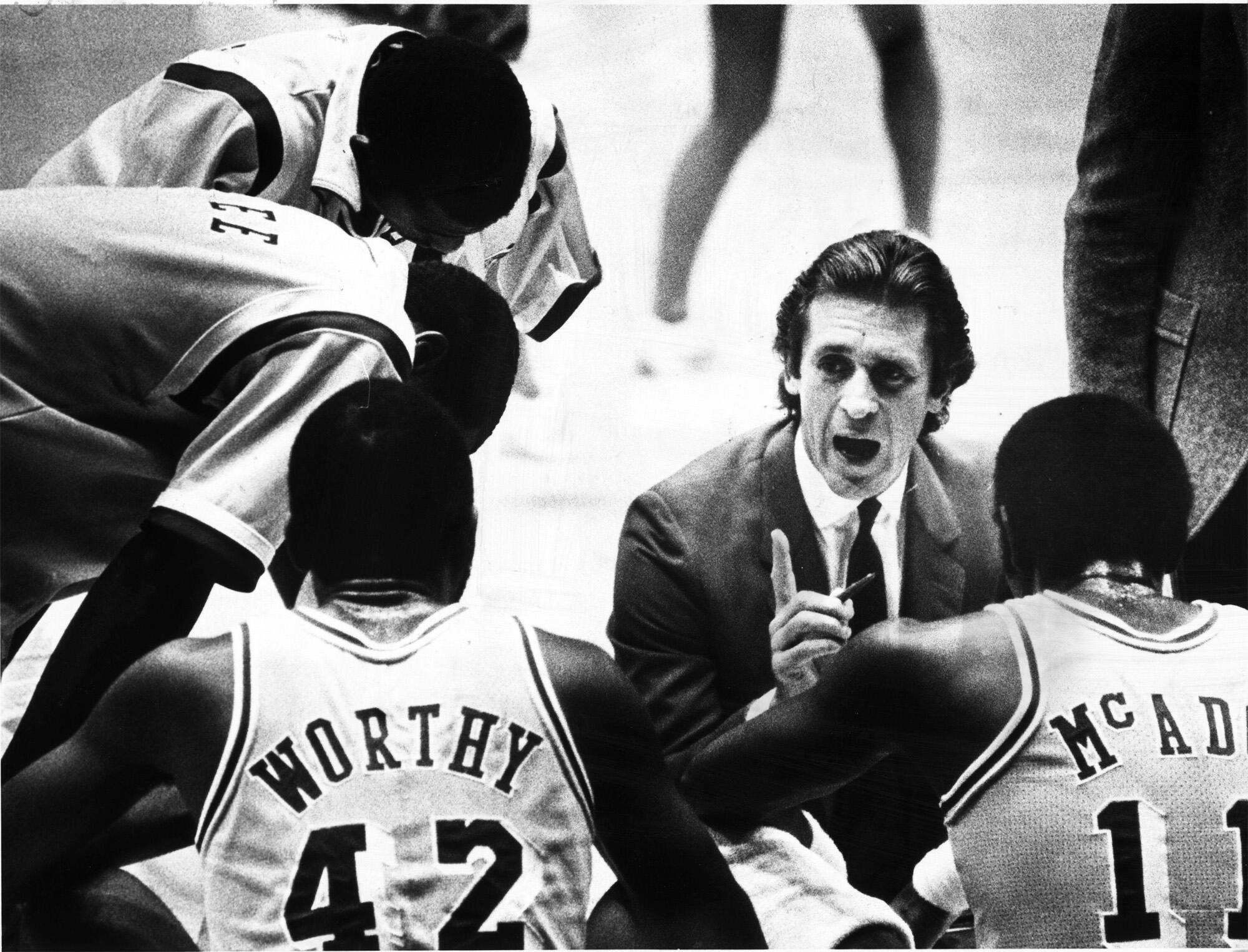
Max Borenstein: Pat Riley was as famous a coach as any coach has ever been — probably the most — because he was a sex symbol in Hollywood, right at the moment where basketball leaped onto a world stage thanks to the rivalry between the Lakers and the Celtics. Then to discover that 10 years prior, or a few years prior, he was a shaggy, ex-hippie, burned-out athlete who had no sense of his own future, you know, who had, had been a star athlete in college, then wound up essentially Jerry West’s practice dummy on the Lakers.
So he won a ring, but he wasn’t the star. He was a role player. And then, you know, the league did what the league does and it kicked him to the curb before he was ready, because no one ever retires on their own terms, despite what they say. And he finds himself wandering the beach, literally playing volleyball, wondering what the hell he’s going to do with the rest of his life at the age of 33, 34.
That’s an incredibly compelling story because the key thing that it does from a dramatic standpoint is it takes someone that we know of as a winner, as a champion, as a hero, and it takes them to a place where none of that is inevitable. It makes them an underdog. And that honestly, that’s the big challenge and the big thing for all of the characters in our show.
[Clip from “Winning Time”: Chick Hearn character: I thought you’re happily retired, you know, sailing off into your golden years.
Pat Riley character: Yeah, no, no, it’s been good.
Hearn character: Yeah?
Riley character: Yeah. Real good.
Hearn character: Terrific.
Riley character: Yeah. Change of pace and all.
Hearn character: Sure.
Riley character: Just kind of been missing it a little. Being around the game.]
Maddox: I think where Pat Riley was in life is one of the things that actually made him a good coach in those early years. Because he could relate to his players, almost as a peer in some cases, he mastered a skill that all great coaches have, which is personality management. He figured out how to allow his players to be themselves and trust their instincts on the court. And it took him pretty far.
Pat Riley is responsible for 10 NBA championships as a player, assistant coach, head coach and executive. And Jeff Perlman told us that since Showtime, where Pat Riley has gone, he has won.
Pearlman: Riley was, he might be the greatest coach in NBA history. He’s definitely in the top five. If you go through the history of the NBA, let’s go through the modern history of the NBA in 1980 forward, we’ll say it’s Red Auerbach and Riley are the two most important figures.
I’ll tell you the genius of Pat Riley: He takes over as the coach of the Lakers. He looks around and he says, “OK, here’s what I have. Here are the pieces I have. We’re going to run this up-tempo system, basically the Jack McKinney system,” and he perfects it. He takes over the Knicks. He looks around the Knicks. They have Patrick Ewing. They have Charles Oakley. They have Anthony Mason. This is a prodding team.
Most coaches have a system, and they stick to that system and they force their players to be parts of that system. Pat Riley always adjusted to his players. He did a complete 180 and became a coach of the most hardcore team in the NBA. That is really hard to do. I can’t understate how impressive that is as a coach. Pat Riley, it’s unbelievable.
He also really understood L.A. He understood L.A. in the ’80s. He sort of got the glam and the celebrity of it and the whole slicked hair and the suits and looking cool. He got it, kind of like kind of like how Jerry Buss understood it and how Magic understood it: Being a part of the Lakers back then, it wasn’t just about basketball. It was about image and marketing and making money on the side and getting your suits for free from a sponsorship deal. And, you know, he’s nicknamed GQ and he wound up on the cover of GQ. Like he just had that whole thing.
So he was a great basketball coach and he also understood what it meant to be the coach of the Lakers. The guy’s, the thing is, he’s kind of like a chameleon. He goes to these different places, he figures out what needs to be done, and he does it.
::
Maddox: It’s a jam-packed gym in a high school in — I’m going to mess this up. Shene-, Shene-, Shenectady.
Brennan: Schenectady.
Maddox: Schenectady.
Brennan: Schenectady, New York.
Maddox: So we’re in a packed high school gym, Linton High School in Shen —
Brennan: Schenectady.
Maddox: Schenectady. That C should be a K.
Brennan: This. OK. This is actually a really good pairing. ’Cause I think next week is when you’re going to teach me the sky hook or maybe we’re about two weeks from the sky hook. So this is my trade. I taught you how to pronounce Schenectady.
Maddox: Schenectady.
Brennan: You’re going to teach me how to perform a sky hook. Is that how you would describe it?
Maddox: Uhhhh, yeah. It’s close enough. Like, execute sounds like a —
Brennan: Execute. OK.
Maddox: Execute a successful —
Brennan: “Perform” is definitely like the gay non-basketball player’s way of describing how to do a sky hook.
Maddox: Performed a sky hook. Executed a sky hook. Schenectady.
Additional resources
Mike Littwin, “The Rise & Fall of Jack McKinney,” Los Angeles Times (Jan. 14, 1985)
Jeff Pearlman, “Showtime: Magic, Kareem, Riley, and the Los Angeles Lakers Dynasty of the 1980s” (2013)
Pat Riley, “The Winner Within: A Life Plan for Team Players” (1993)
Jerry West, “West by West: My Charmed, Tormented Life” (2011)
Paul Westhead, “The Speed Game: My Fast Times in Basketball” (2020)
More to Read
The complete guide to home viewing
Get Screen Gab for everything about the TV shows and streaming movies everyone’s talking about.
You may occasionally receive promotional content from the Los Angeles Times.



